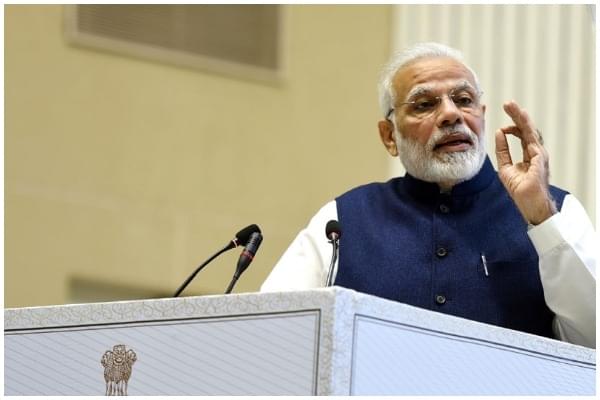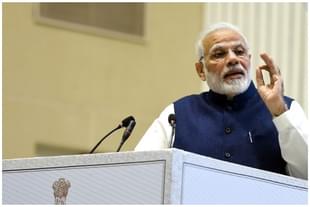Politics
Time For A Modi Visit And Easing Of Lockdown: Kashmir Needs Tough Love
R Jagannathan
Aug 29, 2019, 10:16 AM | Updated 10:15 AM IST
Save & read from anywhere!
Bookmark stories for easy access on any device or the Swarajya app.


On 5 August, the annulment of article 370 and bifurcation of Jammu & Kashmir into two Union Territories will have completed a full month. And with the Supreme Court now beginning to intervene in the matter – it has admitted a petition challenging the article 370 revocation for hearing in October – the Centre should know that time is running out.
If the objective of the first month of the lockdown of Kashmir Valley was to ensure that there was no mass violence, it has achieved that goal by restricting movements of people, issuing prohibitory orders, and clamping down on communications, including internet services, mobile telephony and data services.
However, it would be tough to claim that Kashmir has returned to “normal” just because there have not been daily killings for a while, though even that has begun sporadically.
The government is probably hesitant to remove the curbs too quickly, for it may fear mob violence and resumption of jihadi terrorism. But claiming normality when there is a lockdown is not the best way to establish its claims.
The truth is that Kashmir – especially some districts in the Valley – has never been normal for too long. For large periods after 1989-1990, when the Pandit exodus happened, J&K has been a violence-prone conflict zone, with periods of calm being rare and far between.
With or without the clampdown, the Modi government will have to live with this reality in the foreseeable future. So, there is no benefit in keeping the lockdown total. The worst that can happen is a return to what was happening before 5 August – more mass protests and mob violence. This has to be handled with much closer monitoring of social media to ensure preventive policing, and much stronger protections for police personnel from stone-pelting mobs and even jihadis. In other words, business as usual.
The Modi government will be blamed anyway for whatever violence takes place, especially since large segments of the Delhi and international media have never been charitable to it. The unbalanced way in which the post-article 370 weeks have covered makes it obvious that English media coverage will be unfair.
Consider how everyone has focused on the anger in Kashmir, and not the muted celebrations in Jammu and Ladakh. The media has thus abandoned its objectivity in Kashmir, by focusing on only on feelings in Kashmir Valley, and repeatedly pandering to a sense of Muslim victimhood.
That said, the time has come for not just an easing of the clampdown, but also a special Narendra Modi intervention in the Valley. He needs to pull no punches, but he can reach out to tell Kashmiri Muslims why article 370 had to go, and how by being full Indian citizens they have lost nothing but their handcuffs to corrupt local politicians.
In fact, they may have gained. If needed, he can promise to put in place some restrictions on non-residents owning land in Kashmir (but not property in general), as long as this restriction does not discriminate only against Kashmiri women (as article 35A did before it was scrapped).
The speech, which can be delivered to a small gathering of Kashmiri citizens and intellectuals and televised, should focus on why article 370 does not do good to Kashmir. But it should not try to evade the real issues Kashmiris must face up to.
The highlights of the speech should include the following difficult points:
One, why did article 370 not prevent Pandits from being evicted from the Valley?
Two, how is jihadism and Islamism compatible with the previous syncretism of Kashmir, which is also a key fountainhead of Hindu civilisation? Modi should emphasise that Kashmir is closely associated with Hinduism and Shaivism, and hence it is not just a Muslim-majority province.
Most Kashmiris probably don’t even acknowledge this reality fully. He should ask whether Kashmir will remain secular, or a safe place for people from all communities?
Three, Modi should emphasise that if Kashmiri does not remain a peaceful place for all communities, it will remain a war-zone. In this context, Modi can promise a return to full statehood once peace reigns, jihadis don’t target local policemen and the army, and stone-pelting tapers off.
He should additionally ask how the murder of policemen and armymen, some of them Muslims, is justifiable in any state. If these things do not happen, there will be no need to keep Kashmir under regular lockdowns. Modi can mildly emphasise that Kashmir will always be part of India. No power on earth can change that.
Four, Modi needs to make it obvious that Kashmir has suffered due to the loss of its syncretic DNA, and development needs peace. And this peace can only happen within the context of the Indian constitution, which is secular.
Five, Modi should contrast India’s patience of over 70 years when Pakistan essentially disempowered those Kashmiris, including residents of Gilgit-Baltistan, who live on the other side of the line of control. Pakistan even gifted parts of unified J&K to China without the permission of Kashmiris. Pakistan has changed the demography of Pakistan-Occupied Kashmir, something India has never done, and would never do as long as peace reigns.
Six, Modi should explain that Pakistan wants Kashmir and not just because it is a Muslim majority region, but because it wants total control – along with China - of the Indus and Jhelum waters that run through the state.
Seven, Modi should additionally adopt a new idea and announce it in Kashmir – that his government will pass on more financial and political powers to states, and Kashmir will benefit from that as well. It will be even better than article 370, which gave Kashmiris a sense of separation without any real benefits.
Eight, development is important, but Modi’s out-reach needs to focus on the emotional aspects of Kashmir’s alienation. He should gently point out that if Kashmiris feel alienated from the rest of India, they should be in a better position to understand the alienation of the Jammu Hindus and Ladakhis. He can even grandly announce that once the return of the ethnically-cleansed Pandits to the valley becomes a reality, J&K can be fast-tracked to full statehood again.
This will put the ball in the Kashmiri court, where the onus of bringing peace is not only that of the administration, but civil society too.
Nine, Modi should point out what Kashmiris already benefit by being part of India: they get to study, work and buy land in all parts of India, with the same rights as any other Indian.
There could be many more points, but the core objective should be to speak from the heart to Kashmiris, without leaving out the bits they may not want to hear about.
Kashmir needs tough love, and not just general talk of development and jobs. Those go without saying.
Jagannathan is former Editorial Director, Swarajya. He tweets at @TheJaggi.





